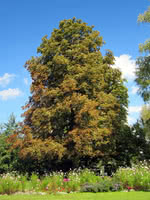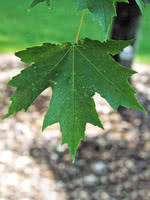Mon-Fri 9am - 5pm Mountain time
Horse Chestnut vs Armstrong Maple
Aesculus hippocastanum
Acer x freemanii Armstrong
CUSTOM GROW
NOT AVAILABLE THIS SEASON - MIGHT RETURN
Horse Chestnut is a medium sized deciduous tree that is native to Greece but has been grown in North America for hundreds of years. It produces large nuts.
A top CO2 absorbing species. Experts think this tree may help climate change more than others.
The Armstrong Maple has a narrow, upright columnar growth habit. This stunning tree has showy leaves that range from yellow, orange to red in the fall. It is an attractive hybrid of the Red Maple and Silver Maple. It prefers acidic soils and will have some tolerance for drought once mature.
Edward Murray named the Armstrong Maple in 1969 in honor of Oliver M. Freeman of the National Arboretum, who made the first controlled cross between the two species in 1933.
Horse Chestnut Quick Facts
Armstrong Maple Quick Facts
Toxicity: most parts of plant are toxic

